"True friendship is that we are brothers to each other in Jesus Christ," said the Bishop of the Danubian church district, and Ministerial President of the Synod of RCH, Zoltán Balog. This was the bishop's message at the service of the Korean church in Budapest, where he preached The Word on Sunday, April 2nd. In addition to more than fifteen years welcoming Koreans both working and studying in Budapest, the congregation has spent more than ten of those within the Reformed Church in Hungary.
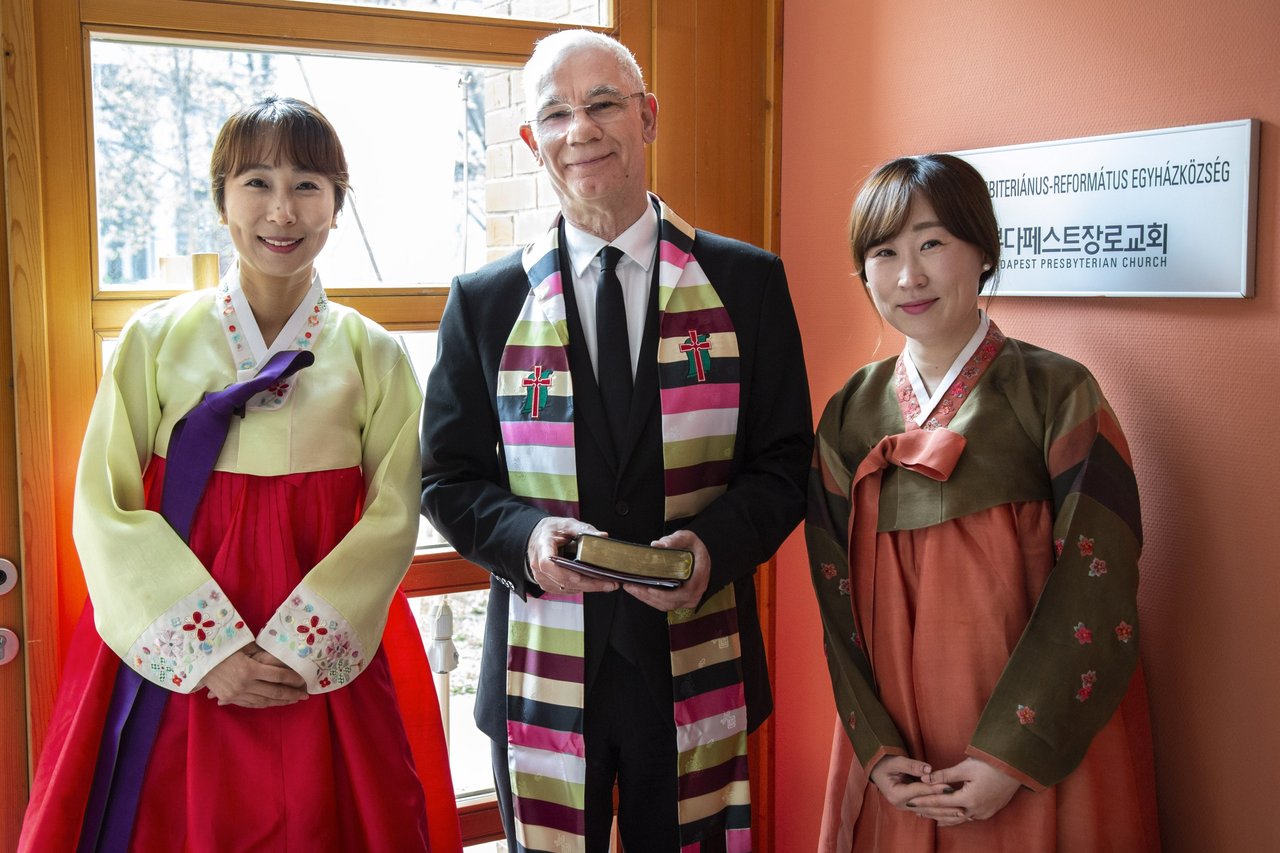
Bishop Balog was received by women in traditional folk costume
Koreans gathered in Budapest on Sunday in front of the headquarters of the Ecumenical Council of Churches in Hungary (ECCH). Yet—these individuals are not tourists. In fact, those gathered outside are actually members of the Presbyterian community here in Budapest. This community and the congregation of the Presbyterian Church of Korea (PCK) have sustained an active presence in Hungary since 2007. Though first received by a local Reformed community in Budapest, the congregation moved to the ECCH's building in 2011 due to a membership increase. The Korean church does not operate in isolation in Hungary; it has been a member of the Hungarian Reformed Church since 2012 and is active in matters that affect Hungary. For example, the church completes mission work and regularly collects for the needy. Since the outbreak of the war in Ukraine, they have repeatedly organized large fund-raisings for the Transcarpathian communities. Most recently, in cooperation with the Hungarian Reformed Church Aid, the church assisted in supporting victims of the earthquake in Turkey and Syria.
Foreign letters, familiar message
We were greeted loudly in front of the entrance, and upon entering, ladies dressed in Korean folk costumes and gentlemen in immaculate suits were bowing to us. This was the way they welcomed every single visitor. The choir practiced in the foreground, and the musicians prepared for the service inside. There was still more than 45 minutes until the start. Many people sat down inside half an hour before service began; those who didn't were still outside talking with fellow church members. The language of the conversations was Korean, and the projected song lyrics were written with Korean characters, unfamiliar to the Hungarian eyes. Yet, nearly everyone spoke English or Hungarian as well.
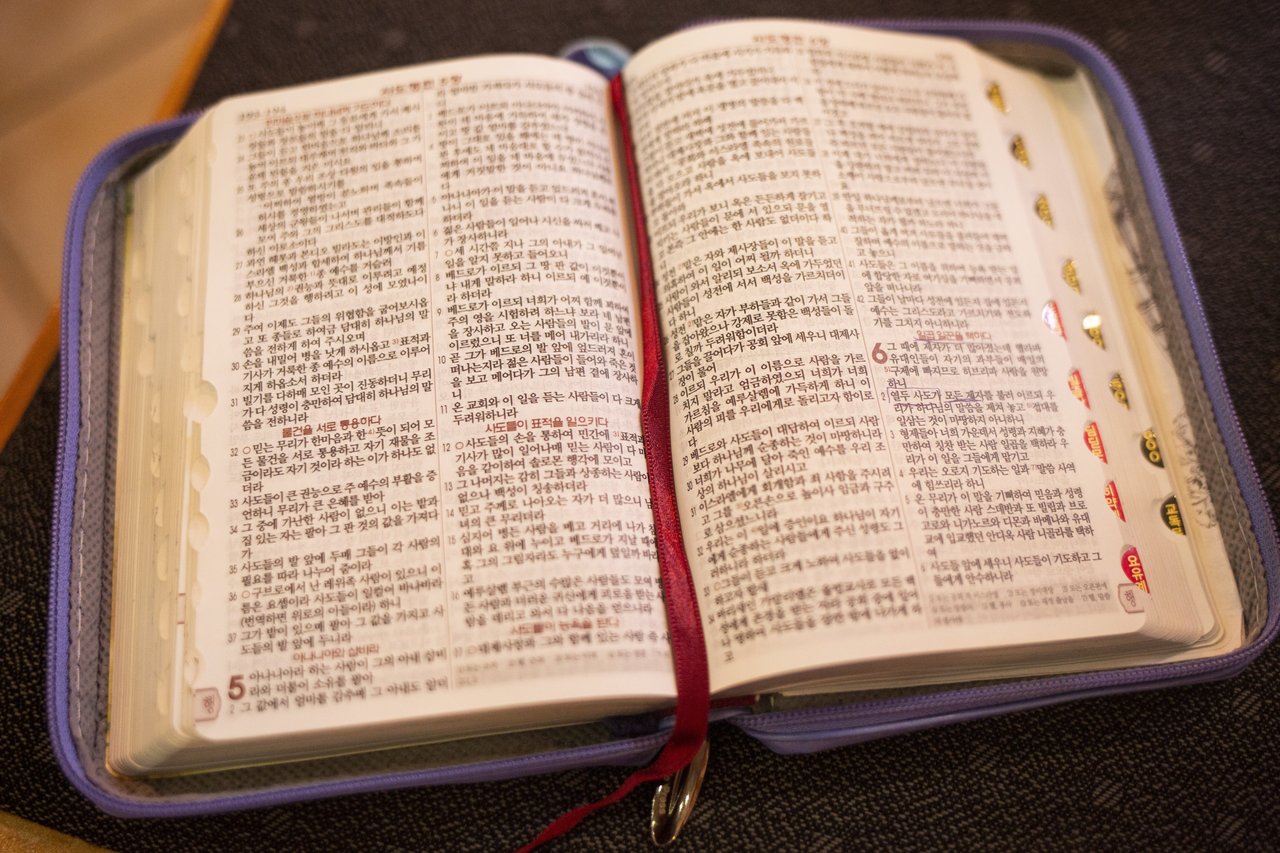
Korean Bible – letters are strange, but the message is just the same
Most of the service was difficult to follow because everything was in Korean. Still, one could quickly tell that singing and music played a significant part. Easier to follow was the Lord's Prayer; even in a different language, it sounded the same.
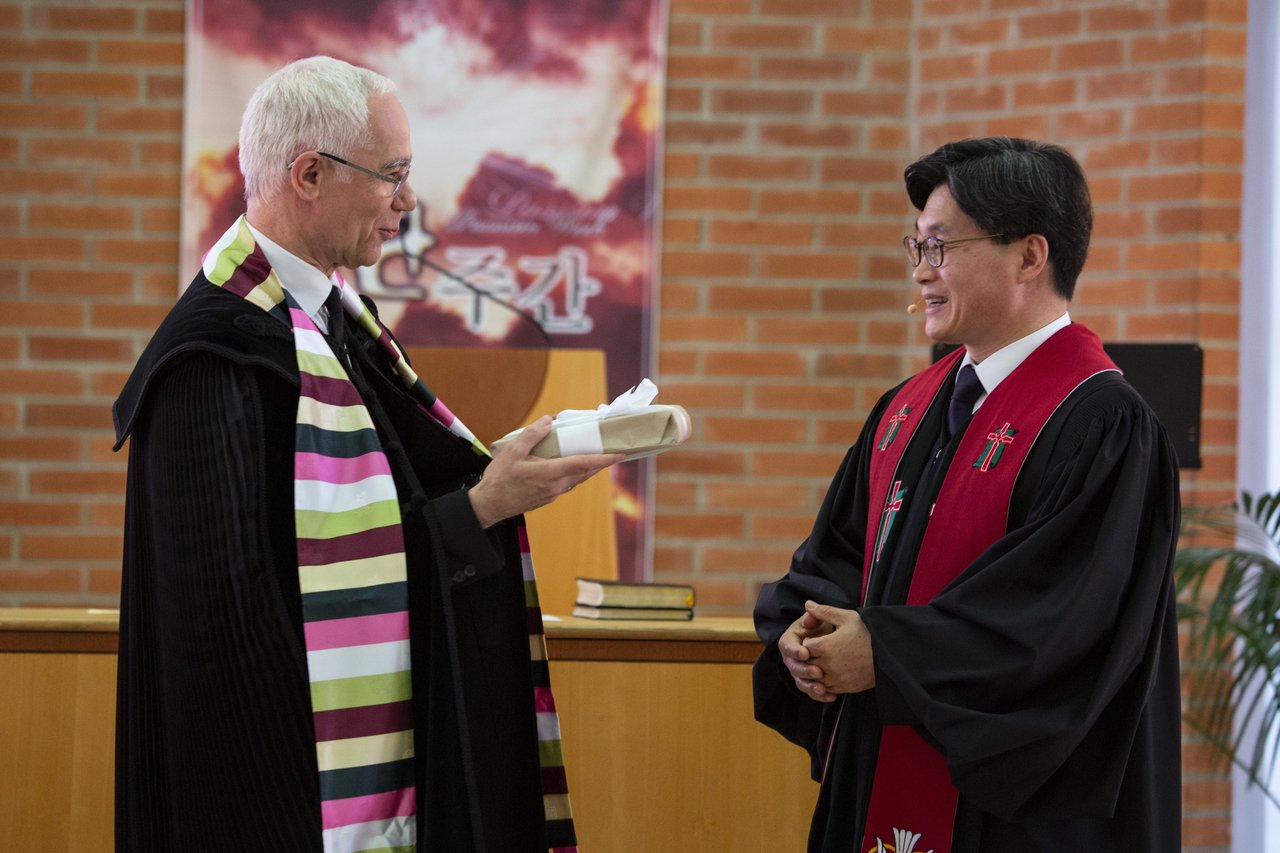
Bishop Zoltán Balog and Jeong Chae Hwa, senior pastor, changed presents
“It is a difficult book. The Bible. But if we understand what God says, it becomes easy," said Bishop Zoltán Balog as he handed over his gift to the congregation. His words were interpreted by the pastor of the Korean community, Jeong Chae Hwa. In addition to the Bible, he brought a book about the crown of St. Stephen. He invited the whole congregation to view the crown together in the Parliament.
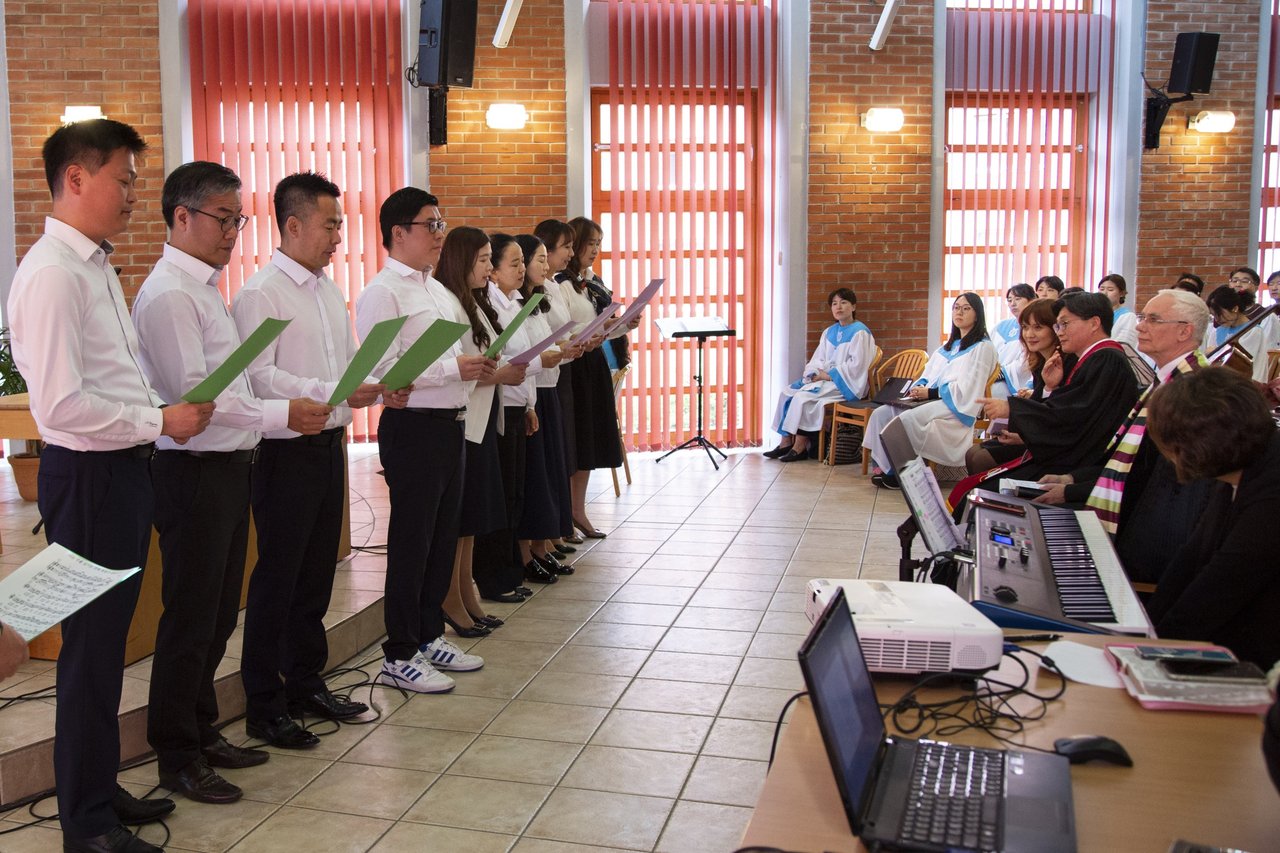
Singing and music played an important role in the worship
Bishop Balog said that when he visited South Korea, everyone made the connections between the English name of our country, Hungary, and the Huns. And so, while this demonstrated an existing kinship, Balog was even happier when they responded with Jesus as a connection as well. "Because this is true kinship, that we are brothers to each other in Jesus Christ. That is why I am happy that this congregation has been a beloved and full member of our church for ten years," said the bishop, whose hope is that many people will answer Jesus Christ in Hungary as well.
God's from head to toe
Zoltán Balog delivered his sermon based on Luke 20:20-26. The bishop reminded us that in this verse, the scribes and chief priests kept an eye on Jesus, but they also keep an eye on us Christians today and try to catch us with what we say and don't say. "There may be a negative emotion behind it, but it still means that Jesus and Christians are important in the world," said the Ministerial President of the Synod. He emphasized that he really wants to give an answer to the questions that would satisfy all needs and make Christians, atheists, right-wingers, and leftists alike happy. Yet there is no such answer, so one should not look at the preferences of others but towards what Jesus says. "He didn't give an answer that pleased everyone, but instead asked: 'Do you have tax money?' By this, he indicated that he does not have any because he has no land, house, or workplace," explained Zoltán Balog. Jesus revealed to the questioners that they just wanted to cheat; they did not want to pay taxes, while they had already decided to participate in profane things. "'Then pay to Caesar the things that are Caesar's' This means that if we participate in everyday life, we must also follow secular rules and set a good example for others," said the bishop.
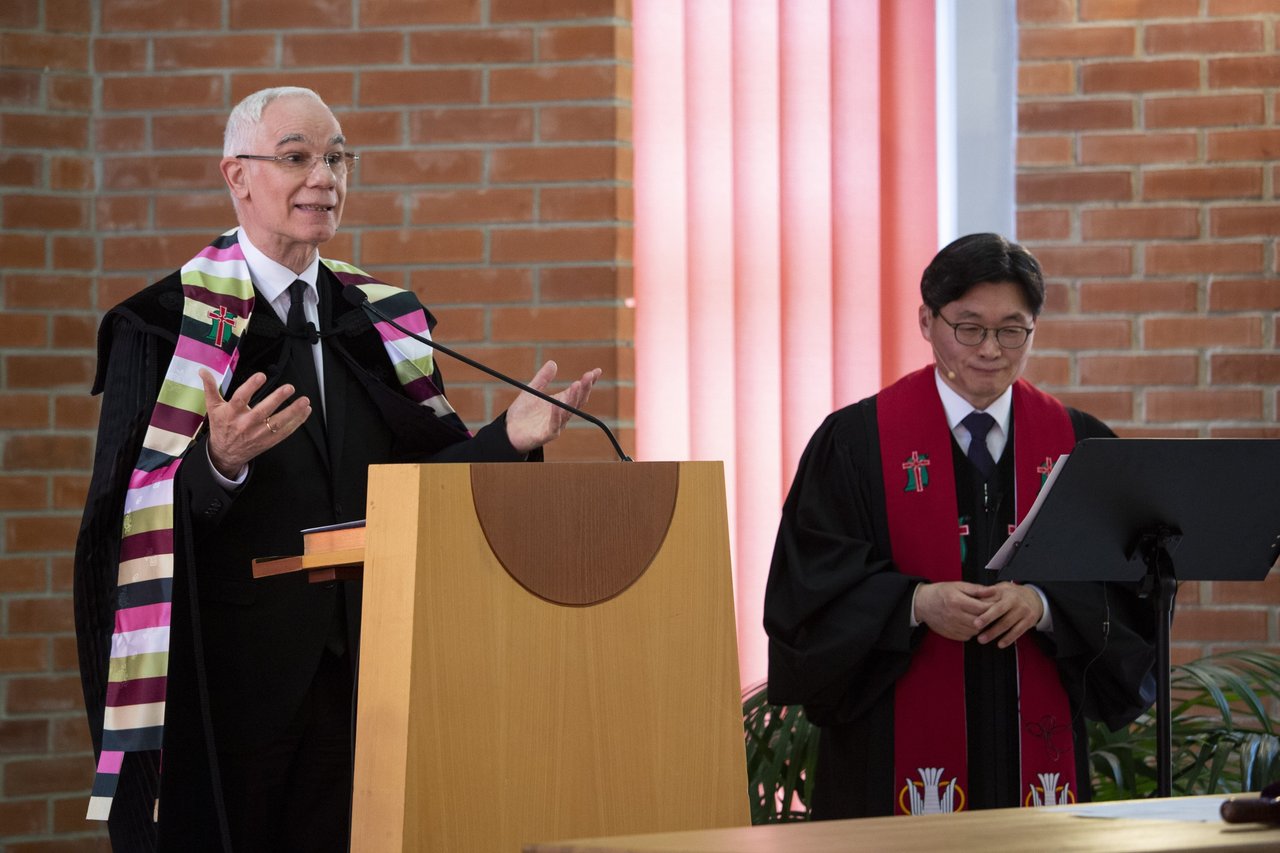
At the same time, he reminded us that men cannot be divided between the "emperor's world" and the world of God, neither in percentages nor broken down into days or hours. There is no such thing as one day we belong to the emperor and the next to God. "There is a picture of the emperor on the money, it's his. But where is the image of God?" asked Zoltán Balog, and he answered: on us, therefore we belong to God one hundred percent, from head to toe. Even when we're working, even when we're with our families, always. Those who have completely surrendered their life to Jesus can surrender their life to their neighbor and the other person. I wish this inner freedom for everyone in Korea and in Hungary as well, was the hope that concluded his sermon.
They prepared for the meeting by praying
Pastor Jeong Chae Hwa told us after the service, before the reception, that they were pleased with Zoltán Balog's visit and had a good relationship with the Reformed Church in Hungary. He revealed that the congregation had prayed for this visit and thanked God for the meeting.
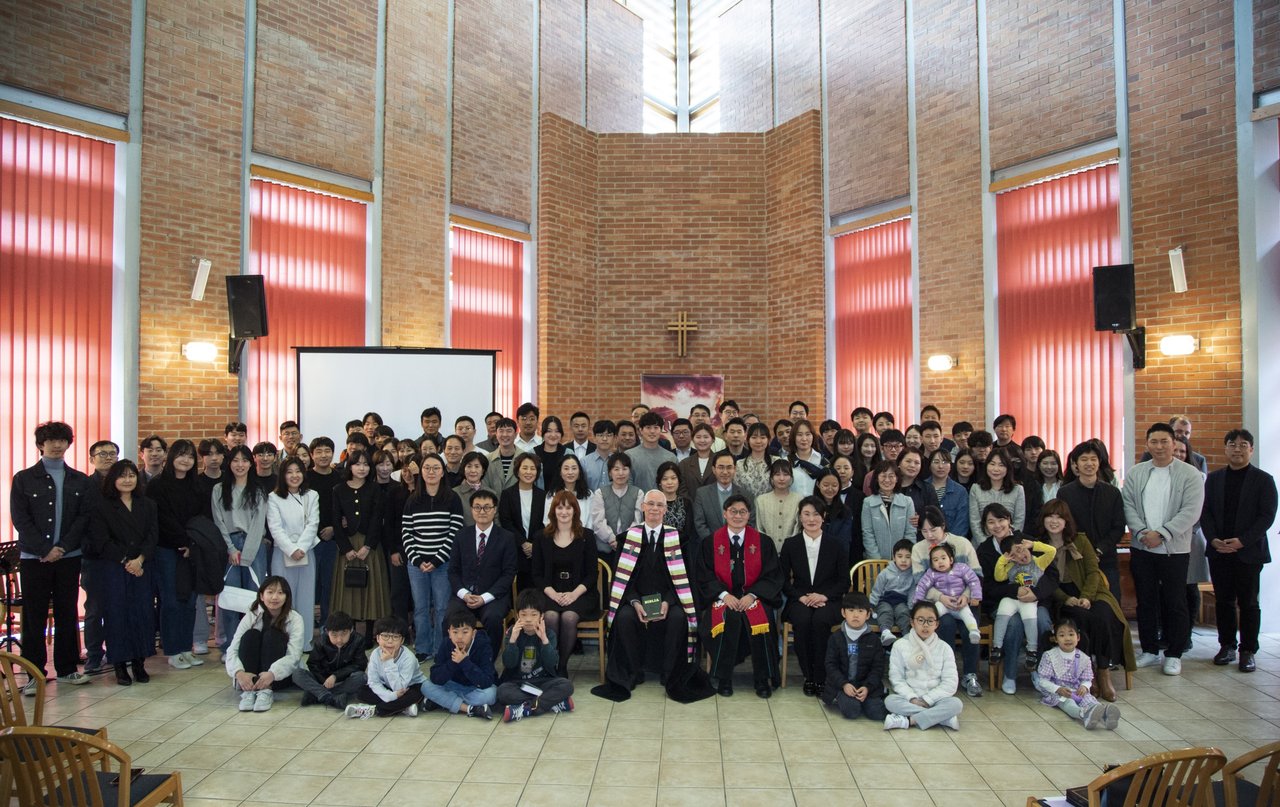
Members of the Korean speaking reformed congregation with Bishop Balog
The pastor emphasized that the relationship is close between the congregation and the Reformed Church in Hungary and between the latter and the Korean Presbyterian Church. There is also a connection between mission, solidarity, and communication, most recently due to the war in Ukraine and the Turkish-Syrian earthquake. The Korean congregation and the Korean Presbyterian Church maintain contact with the Hungarian Church, the Hungarian Reformed Church Aid (HRCA), and other Reformed organizations. Jeong Chae Hwa added that the Budapest church has already organized two fund-raisings for the victims of the war in Ukraine and the earthquake. A third is taking place now, and the collected offerings will be handed over to the HRCA on April 19.
Korean-speaking Reformed Congregation in Budapest
Since 2012 the Reformed Church in Hungary has a Korean speaking ministry, supervised by the Presbyterian Church in Korea (PCK), recognized as a mission congregation by the Synod of the Reformed Church in Hungary.